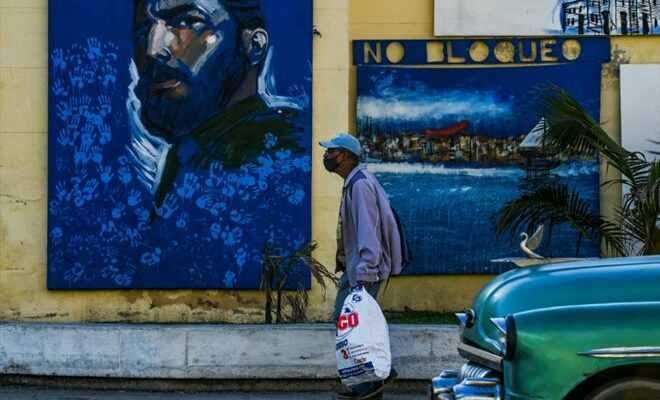An old American car, in Havana on February 3, 2022 (AFP / YAMIL LAGE)
In force for 60 years, the American embargo against Cuba has become endemic, a reality to which its inhabitants have become more or less accustomed, without much hope of seeing it lifted or lightened soon.
“I know that all of this is due to the economic situation, the lack of products, the blockade, all these things”, sighs Urbano Navarro, a 62-year-old retired carpenter, in a street in Havana where the queues are endless in front of the stores.
The imposition of an embargo on February 7, 1962 was in response to a climate of growing confrontation between the two neighboring countries, which would culminate in the missile crisis in October of the same year, plunging the world to the brink of nuclear war.
He “appeared as an instrument in this war (…), a strategic and military instrument”, political scientist Rafael Hernandez reminds AFP.
Opposite, no concession has ever been obtained from Havana, determined to be communist “under the nose and beard of the empire”, as Fidel Castro said.
And even if times have changed, a recent telephone conversation between Cuban Presidents Miguel Diaz-Canel and Russian President Vladimir Putin, who said they wanted to strengthen their “strategic cooperation”, recalled the days of the Cold War.

The American embassy in Havana, February 3, 2022 (AFP / YAMIL LAGE)
Russian Deputy Foreign Minister Sergei Ryabkov has not ruled out a military deployment in Cuba, if the conflict with Washington over Ukraine degenerates.
Havana also relies on the support of its allies such as China, Vietnam and a growing number of leftist governments in Latin America.
– “A virus” –
The fact remains that its economic development is prevented by the embargo. “The blockade is also a virus,” the authorities have been proclaiming for months, organizing caravans of cars, bicycles and motorcycles across the country to denounce these sanctions.
Even today, it is the “geopolitical interests” of the United States that determine the relaxation of the embargo or its hardening, explains Rafael Hernandez, who underlines that Barack Obama is the one who had brought the greatest relaxation.
But no one had tightened the sanctions to such an extent as Donald Trump, who added 243 measures. And despite Joe Biden’s campaign promises, the latter did not lighten anything.
He even issued new sanctions against Cuban officials, castigating the “repression” of the historic protests of July 11, 2021.
According to analysts, the Democratic president hopes for a better position from his camp after the half-term elections in October.

A street in Havana, February 3, 2022 (AFP / YAMIL LAGE)
However, the prospects for the ballot “are rather negative, and dangerous for the island” if the Republicans gain ground in Congress, notes a recent study by Carlos Ciaño, of the Center for Research in International Politics, an institute of the Cuban state.
The problem is that, for the Biden administration, “the electoral calculation weighs much more than humanitarian duty”, regrets James Buckwalter-Arias, of the Cuban-American Association for Engagement (Cafe).
– “Creative resistance” –
Recently, President Diaz-Canel called on Cubans to show “creative resistance” to the embargo.
But it’s hard to be creative when the island is going through its worst economic crisis in 30 years, with 70% inflation and a worsening shortage of food and medicine.
For the defenders of the government, the embargo is the cause of all the evils. Critics counter that the economy’s own inefficiencies and structural problems weigh more heavily.
“There is no blockade, just a partial embargo,” says the opposition organization Cubadecide, led from exile by Rosa Maria Paya.
“The real blockade was imposed by the Cuban state” and will only be eliminated through “a transition to representative democracy”.
Since 2000, Cuba has been able to buy food from the United States, which is now exempt from the embargo. Between 2015 and 2020, the island imported $1.5 billion worth of food – mostly chicken – from its neighbor.

A man walks past a sign bearing the image of Fidel Castro, in Havana on February 4, 2022 (AFP/YAMIL LAGE)
But these purchases must be paid in advance and in cash, conditions that are difficult to meet.
In general, the embargo is “counterproductive,” said Carlos Gutiérrez, a Cuban-American who was Secretary of Commerce in the United States from 2005 to 2009: “absolutely nothing was obtained” from Havana.
It is “a very cynical policy” if the objective is to trigger a social explosion, “for people to go out in the streets to shed blood”, he denounces, recalling on the contrary the “very astute policy of Obama’s openness, which had given Cuba “two very productive years” by boosting the private sector.
© 2022 AFP
Did you like this article ? Share it with your friends with the buttons below.




